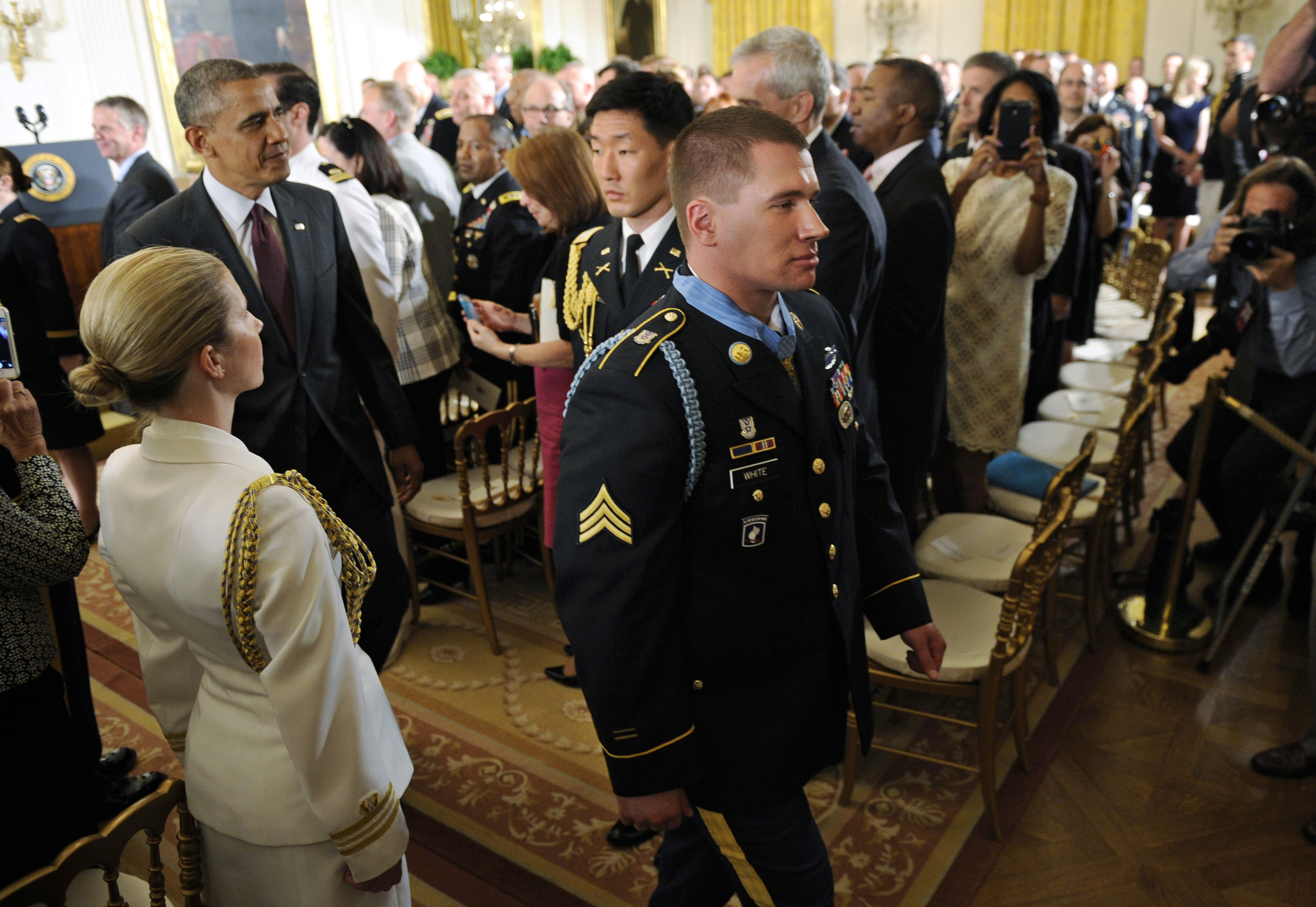
There are now seven living recipients of the Medal of Honor as a result of the wars in Afghanistan and Iraq.
President Obama presented the medal to former Army Sgt. Kyle J. White, a Seattle native, today.
We’ll let him tell the story:
Across Afghanistan, base commanders were glued to their radios, listening as American forces fought back an ambush in the rugged mountains. One battalion commander remembered that “all of Afghanistan” was listening as a soldier on the ground described what was happening. They knew him by his call sign — “Charlie One Six Romeo.” We know it was Kyle, who at the time was just 20 years old and only 21 months into his military service.
Earlier that afternoon, Kyle and the 13 members of his team, along with a squad of Afghan soldiers, left an Afghan village after a meeting with elders. The Americans made their way back up a steep hill — single file, along a narrow path, a cliff face rising to their right, and a slope of rocky shale dropping on their left. They knew not to stop, that they had to keep moving. They were headed into an area known as “ambush alley”.
And that’s when a single shot rang out. Then another. And then the entire canyon erupted, with bullets coming from what seemed like every direction. It was as if, Kyle said, the whole valley “lit up.”
The platoon returned fire. Kyle quickly emptied a full magazine, but as he went to load a second, an enemy grenade exploded and knocked him unconscious. He came to with his face pressed against a rock. And as he moved to get up, enemy rounds hit a rock just inches from his head, sending shrapnel and rock shards across his face.
Most of the unit had been forced to slide down the cliff to the valley below. But Kyle saw a teammate — Specialist Kain Schilling — trying to treat his own shattered arm, using a tree as cover — what Kain later called “the smallest tree on Earth.” I’m sure that’s how it felt. Kyle sprinted through enemy fire to Kain’s side and began applying a tourniquet — shielding Kain with his own body as gunfire shredded that tree.
Then Kyle saw another man down — Marine Sergeant Phillip Bocks — in the open, 30 feet behind them, but too injured to reach cover. Kyle remembers thinking, “It’s just a matter of time before I’m dead. If that’s going to happen, I might as well help someone while I can.”
With bullets impacting all around him, Kyle ran to Bocks and began to pull the injured Marine to cover. But worried that he’d expose Bocks to more gunfire, Kyle retreated. The enemy rounds followed him. He ran out again, pulling Bocks a little farther. And once more he retreated to distract the enemy fire. Once more he went out — over and over thinking to himself, “I’m not going to make it.” Kyle could feel the pressure of the rounds going by him. But somehow, miraculously, they never hit him. Not once. One of his teammates said it was as if Kyle was moving “faster than a speeding bullet”.
And finally, Kyle succeeded in pulling his comrade to cover. Tragically, there on that cliff, Sergeant Bocks succumbed to his wounds. But in his final moments, this American Marine surely found some solace in Kyle White — the American soldier who, until the very end, was there by his side.
Now, that other injured soldier, Kain Shilling, was still out there. And he had sustained another injury, this time to his knee. Kyle ran out once more to Kain’s side. Kyle ripped off his own belt for a tourniquet, and soon got his hands on a working radio. The voice of Charlie One Six Romeo came into base. Crouching behind that lone tree, Kyle began calling in airstrikes to take out enemy positions.
Kyle stayed with Specialist Schilling as night fell. And Kain was too badly injured to move. Kyle was starting to feel the fog of his own concussions set in, but he knew that he was Kain’s best chance to get out alive, so Kyle took charge and ordered the Afghan soldiers to form a security perimeter. He called in a MEDEVAC and made sure Kain and the other injured were safely on board. And only then did Kyle finally allow himself to be lifted out.
As the helicopter pulled away, Kyle looked out the window, watching the darkness as they pulled away from that single tree on the cliff. “When you’re deployed,” he later said, “those people become your family. What you really care about is: I want to get this guy to the left and to the right home.”
White is now an investment analyst with the Royal Bank of Canada.
